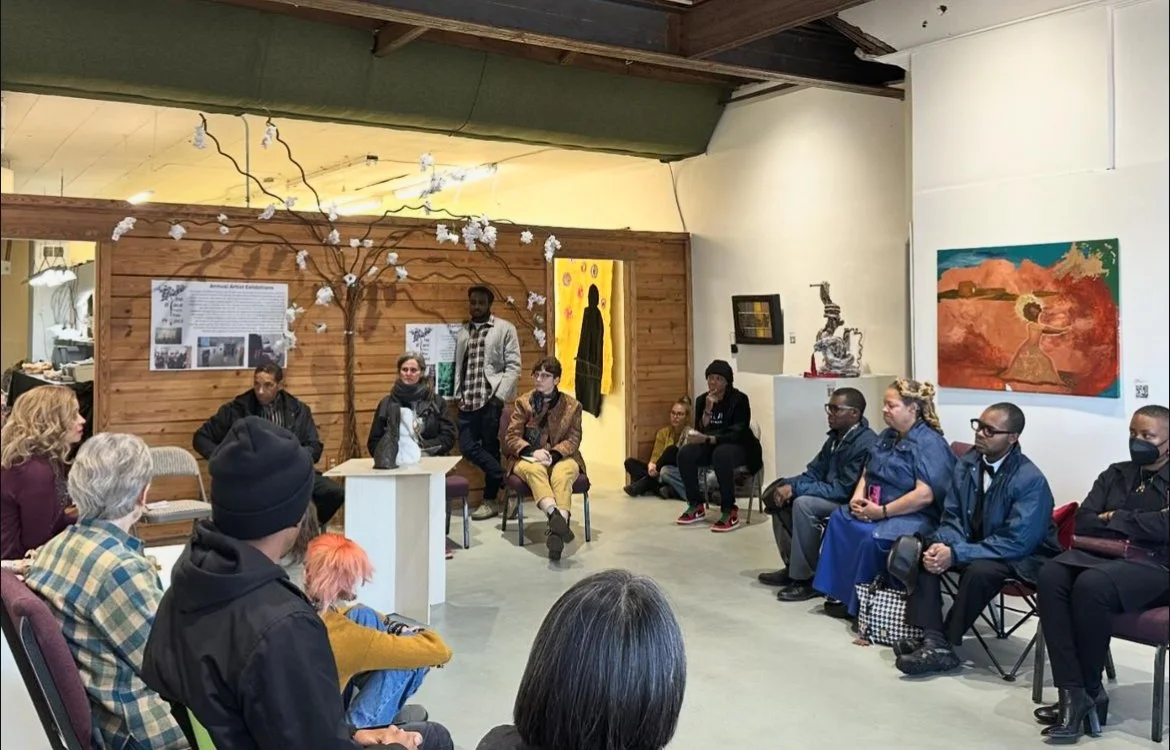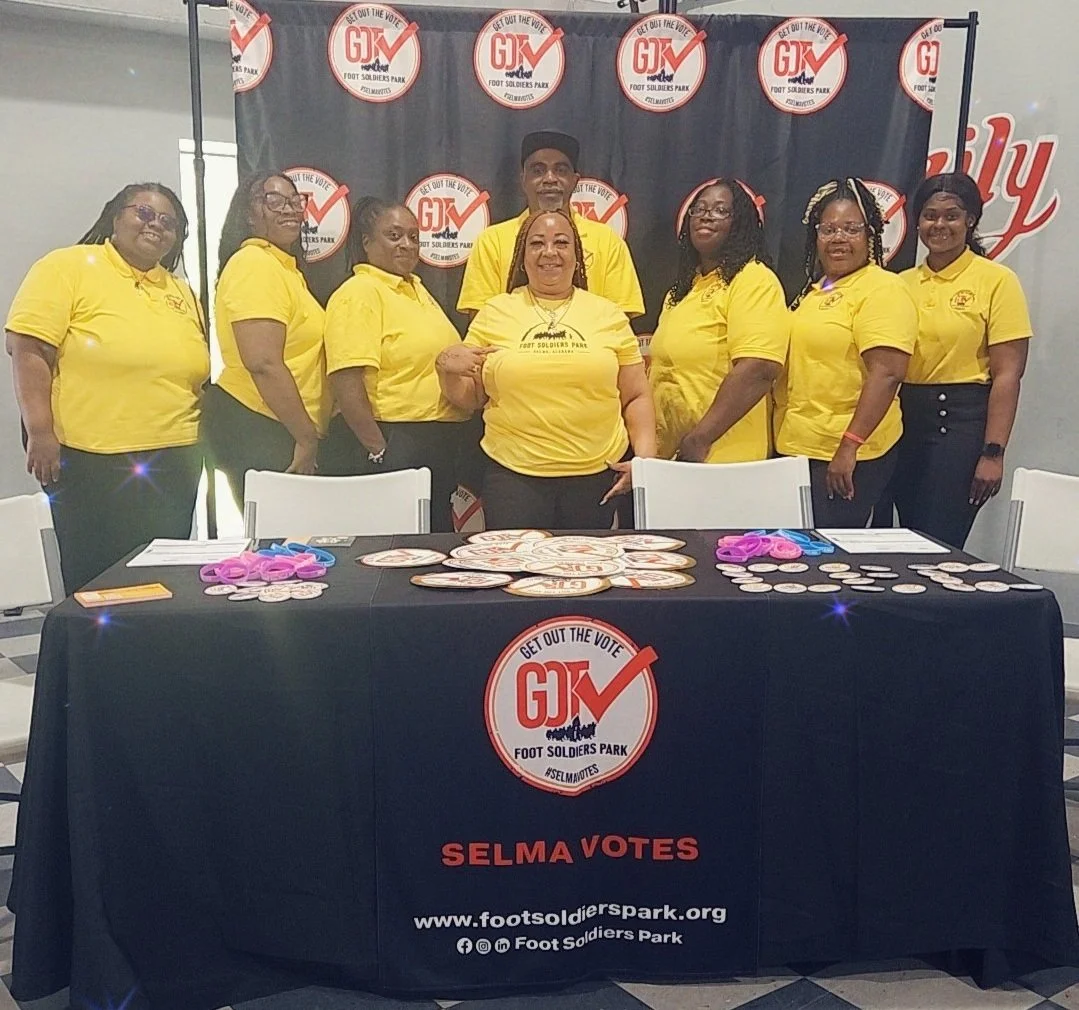Marching Toward Tomorrow: My Journey from Artistic Truth-Seeking to Building the Future in Selma
Carey Fountain
As long as I can remember, I’ve been chasing truth—not the kind found in textbooks or on news tickers, but the kind that lives in conversation, in memory, in the spaces between people. That search has taken me down winding roads as an artist, a cultural worker, and a creator of spaces—spaces for listening, reflection, and change.
Vibes & Virtues card game, Family Ties: Engage Every Generation .
Early on, I began to understand that dialogue itself could be art. That conviction led me to create Vibes & Virtues, a public art experience turned card game and philosophy. With each gathering, I invited strangers to break bread across ideas—exploring justice, race, love, and loss through cards, community, and conversation. It wasn’t always easy. In fact, it often challenges the very comfort we seek in social interaction. But it also sparked something: a collective vulnerability and recognition that we are far more alike than we are different.
BCTP marker and black cherry tree sapling for Lewis Houston.
The evolution of my artistic practice took another transformative step in 2021 with the birth of The Black Cherry Tree Project (BCTP). In response to the racial reckoning following George Floyd’s murder, I co-founded BCTP to honor the 33 documented lynching victims of Jefferson County, Alabama. Local artists select a passed on person, study their story, and create commemorative artworks—ranging from visual pieces to performance and multimedia installations—which are publicly exhibited annually. Alongside this, we plant black cherry tree saplings in local parks, each with a commemorative marker and digital archive.
These trees are more than symbols. They are living witnesses—reminding future generations of the lives taken and the beauty still possible.
And it was this exploration—of how art can provoke, remember, and transform—that eventually brought me to FSP.
Today, I serve as the Director of Programs and Partnerships at Foot Soldiers Park, a young but powerful organization rooted in Selma, Alabama. Just four years old, FSP is already reshaping the soul of a city that once transformed the nation.
BCTP Community Discussion.
We all know Selma for its past. For the Bloody Sunday march. For the image of John Lewis and Amelia Boynton crossing the Edmund Pettus Bridge. For the spark that helped ignite the Voting Rights Act of 1965. But what many don’t see is that Selma today—despite its global legacy—is still a place reckoning with disinvestment, disenfranchisement, and displacement.
That’s where we come in.
Foot Soldiers Park is building a $40 million Park & Education Center—a radical vision born of reverence and fueled by resolve. The land is already purchased. We are activating it now, hosting events, tours, and programs that bring people together and root our work in trust and community ownership. When complete, this space—located steps from where the Bloody Sunday march began—will house a museum, performance space, market area for local businesses, children’s playgrounds, basketball courts, greenspaces, and a civic education hub. At the heart of this dream is our founder, Jo Ann Bland—herself a child foot soldier, SNCC member, and lifelong civil rights warrior, who at just 11 years old, marched alongside protesters that were brutally beaten during the Bloody Sunday march.
Ms. Bland has long reminded us that history isn’t just names and dates—it’s people. Ordinary people who do extraordinary things. People whose names may never appear in textbooks but who risked everything to walk across that bridge. Today, through her leadership, we’re building a space that ensures those stories live on—and that those stories inspire the next generation of changemakers.
At FSP, we don’t just preserve the past—we build the future. Our work spans five core areas: Historic Preservation, Building Wealth, Civil Rights in Action, Youth Engagement, and Whole Self Health. And our programs are as dynamic and interconnected as the movement that birthed them.
Community Engagement Corps educators.
One of the best examples is our Community Engagement Corps (CEC). Inspired by the grassroots organizing of the past, CEC serves as year-round civic educators—knocking on doors, hosting town halls, and helping their neighbors register to vote, navigate public services, and reclaim their agency. These are not seasonal workers—they are the living embodiment of civic power, working 365 days a year to build a more informed, active, and resilient community.
But CEC is only the beginning. We’re developing Entrepreneurship Incubators, Financial Literacy workshops, a Faith & Family Civic Engagement initiative, a Wealth-Building Symposium, and so much more. Our vision is holistic, because liberation isn’t linear—it happens in every sector of life.
What drew me to this work—and what still anchors me—is the synergy between my life as an artist and the mission of FSP. Both are rooted in the same truth: that people have power. That communities deserve to be seen, heard, and resourced. And that justice requires not just memory, but momentum.
“The art I’ve created, the trees I’ve helped plant, and the conversations I’ve curated—they were all part of a larger journey I couldn’t fully name in the beginning. But now, with time and clarity, I see that journey for what it is: a bridge. A bridge between memory and action. Between creativity and community. Between the dreams of those who came before me and the work we carry forward today. My role at Foot Soldiers Park is more than a job—it’s a calling shaped by my lived experience as a Black man, an artist, and a son of the South. Every program I build, every initiative I help lead, is rooted in the belief that our communities already hold the wisdom, talent, and brilliance to reimagine what freedom looks like. I stand in this work not just as a director, but as someone shaped by the same histories I now help preserve—and transformed by the very hope we are planting for the future.”
Selma will change the world again. And at Foot Soldiers Park, we’re not waiting for a moment. We’re making it happen—through sweat, strategy, and a steadfast belief in the power of ordinary people to do extraordinary things.
Building a Nexus of Heritage and Community Upliftment
To learn more about our work and join us in this journey, visit footsoldierspark.org.
ABOUT THE AUTHOR
Carey Fountain is a cultural strategist, artist, and community-builder who serves as the Director of Programs and Partnerships at Foot Soldiers Park in Selma, Alabama. A native of the South with a deep commitment to justice and creative expression, Carey brings over a decade of experience in designing transformative spaces that elevate truth, foster civic agency, and bridge generational divides.
Before joining Foot Soldiers Park, Carey founded Vibes & Virtues, a public art project turned national dialogue movement that uses cards and conversation to explore race, justice, and identity. His creative journey deepened with the launch of The Black Cherry Tree Project, a groundbreaking initiative that honors lynching victims in Jefferson County, Alabama through community-based art, public memorials, and storytelling.
At Foot Soldiers Park, Carey leads a team in the development of innovative programs rooted in five key pillars: Historic Preservation, Civil Rights in Action, Youth Engagement, Whole Self Health, and Building Wealth. From voter registration BBQs and town halls to youth entrepreneurship initiatives, Carey is building out a civic and cultural infrastructure that meets people where they are—on the front porch, in the classroom, and at the ballot box.
In just over 4 years, Foot Soldiers Park has expanded its Community Engagement Corps (CEC) into a year-round civic education model, launched a successful Selma Cinema Festival, and is actively engaging communities across Selma to co-create a $40 million Park & Education Center that honors the city’s legacy while paving the way for its future.
Carey’s work is grounded in a belief that people are the greatest untapped resource in any movement for change—and that art, memory, and action together can help us build the future we deserve.
ABOUT THE AUTHOR
Carey Fountain is a Birmingham artist with a long history of creating and facilitating multi-faceted art events and experiences. He is inspired by the question, Can conversation become art? His curiosity has led to a career as an arts programmer working independently through his own pop-up interactive art event series, Vibes & Virtues, and as a Program Manager for various institutions. Currently, Carey is Director of Programs & Partnerships at Foot Soldiers Park, as well as Founder of the Black Cherry Tree Project and Manager of Public Programs at the Birmingham Museum of Art.








